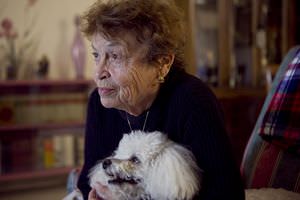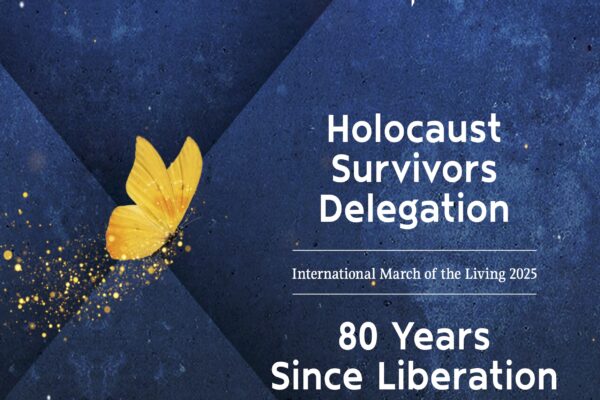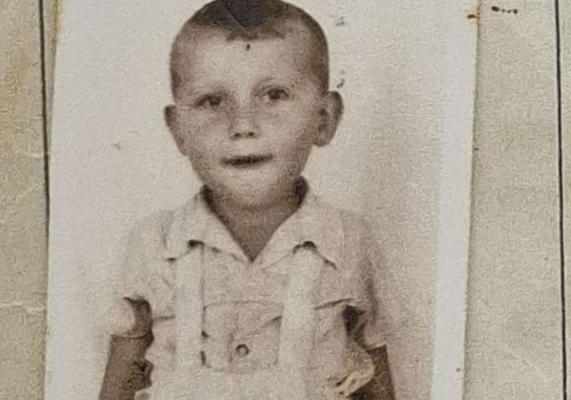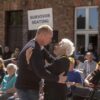
To Helen Handler, the most important thing was family.
I think it’s the first thing she would have wanted me to write about her, even before I told you that she died on Tuesday at the age of 87.
Family was that important to her.
Helen Handler was just 15 years old when she stepped off a crowded rail car into a gray, foggy morning at Auschwitz in 1944. It was the last time she would ever see her mother, her two brothers and her grandparents.
“One minute I was surrounded by my family, by all that love,” she told me. “The next minute, I was all alone in Auschwitz.”
It was a part of a story that Handler told thousands of times over the years to children and adults, to packed lecture rooms and middle-school assembly halls, to documentary film makers and historians, and to journalists like me.
I met Handler almost four years ago when I was writing a story about a Holocaust-era rail car brought to Arizona in 2012. The car will be the central display in the $20 million Holocaust & Tolerance Museum being built on 4.6 acres next to the East Valley Jewish Community Center in Chandler.
We spent the morning at her upstairs apartment, where she lived with her little dog, Pup. In those few hours, I filled an entire notebook with her story, one she didn’t stop telling when tears spilled down her cheeks.
Handler told me then that when your family is taken from you, you can piece together another one.
You have to.
“Family is the most important thing,” she said, and then she leaned forward, put her hand over mine to stop me scribbling in my notebook, and looked me right in the face: “Remember that.”
I promised I would.
‘We must stay together’
The last time Handler saw her family was in that crowded rail car on that day so long ago.
I went with her as she stepped for the first time into a different rail car, the one purchased for the museum. It was much like the one she remembered. The walls were wood, with small rectangular windows set too high to see out.
Handler had raised her arms, gently pressing her hands against the rough plank wall, feeling again the texture she remembered would be there. And then she dropped her forehead to the backs of her hands and began to sob.
As hard as that moment was for her, Handler had been an advocate of the effort to find this car and bring it here in the hopes that what was once a symbol of evil could become one of hope.
She knew it would be difficult to go into the rail car, but she had been determined. Because it was in such a car the last time she was with her family.
“Even if I had to take a tranquilizer, I wanted to walk into that box where I last was with my family,” she said. “It was what my mother wanted — the family was together.”
Handler, whose name then was Ilona Ackerman, was living happily in what was, in 1944, part of Hungary. She attended school and went to the movies. She adored her brothers, Nandor, who was 17, and Micky, 9.
It was a few days after Passover in 1944 when a few men came to the Handler’s house, where she lived with her mother, brothers, and grandparents, and told the family that they could each pack one bag, and then they had to leave.
She packed photographs, a memory book covered in blue velvet, and the little outfit she used to wear to synagogue with her father, who died when she was 6.
The family was taken to a nearby ghetto with other Jewish families, and they were packed 10 to a room. Still, her mother would whisper at night, at least they were together.
A few weeks later, they were marched down the middle of the street, surrounded by police and soldiers, to a brick factory, where they were forced into a rail car.
Nandor got separated from the family but then found them just before the doors to the rail car closed. The doors didn’t open again for four days.
The people packed together inside were terrified.
Two men took charge in the rail car Handler’s family was in. Since there wasn’t enough room to sit down, everyone agreed to let the elderly and the sick have the space on the floor. They took turns relieving themselves in a bucket. They shared what little food and water they had.
“Everybody became one family,” Handler said.
She remembers her mother repeating, “We must stay together. We must stay together,” and holding her and Micky close. That refrain would ring in Handler’s memories for all the decades to come.
Because the family was pulled apart.
At Auschwitz, the people stuffed into the rail cars were lined up, side by side, and a tall SS officer looked them over. Handler remembers looking at the officer’s boots. They were black, and shiny.
The man in the boots was Josef Mengele, the doctor who became notorious for selecting Jews arriving at the Auschwitz-Birkenau camp, for the gas chamber, and for ghastly medical experiments.
Mengele pointed at her, and she was pulled roughly out of the line. Handler was sent one way, the rest of her family the other.
She never saw them again.
But she always remembered.
The ‘tiny miracles’
For Handler, the people in the concentration camp became her second family, and they looked out for one another, as best they could. Later she would marry someone who could understand, a fellow Holocaust survivor, and they had a son, Barry.
Over the years, Handler grew her family as she collected friends and a following from her public appearances. And not just humans, she said firmly. “Pets are family, too.”
I stayed in touch with Handler long after my story was finished. I would call occasionally, and we would talk about latest visit to talk to schoolchildren or how fundraising for the museum was progressing. She asked about my family, every time.
“Family is the most important thing,” Handler told me during one of those phone calls. “It is why we are here. Not for things, like big houses and flashy cars.”
Family, however you define it, provided a safe home base for Handler, a foundation. People take family for granted, Handler thought.
“That’s the tragedy of it,” she said. “You never know what family means until you lose one.”
So Handler told her story in the hopes that what happened would not be forgotten — and that it would not happen again.
Handler survived the horrors of the camp by the grace of what she called “tiny miracles.” A piece of bread that was left by her head as she slept. A hand that pulled her up when she fell. The time she slipped unseen from one line of prisoners to another, saving her own life.
She lived through a death march in freezing temperatures.She was one of 7,000 prisoners freed by the Soviet army in January 1945.
Handler was hospitalized and treated for starvation and tuberculosis for five years before she moved to Canada, where she met her husband, Jack Handler. She moved with her family to Detroit and then Phoenix, where she ran a drapery store at MetroCenter Mall.
‘If I am real, the story becomes real’
After she retired, she devoted her time to speaking. Over the last 20 years, she told her story to thousands of people, from schoolchildren to new FBI recruits, talking about the Holocaust and how she survived.
Handler was tiny, not even 5 foot tall, but huge groups, hundreds of people at a time, would fall silent when she spoke. No one remembers ever seeing her use notes. She had been in Toastmasters after all.
She didn’t care if someone was Jewish, or Christian, or Muslim, or Hindu, or no religion at all. We were all created by the same God, she maintained.
“That means that everyone who is sitting next to you is your brother and sister, and even if you don’t love them, you must respect them,” she told children and adults alike.
The Holocaust happened because people let it happen, Handler said, and the people who stood by and watched were as guilty as the perpetrators themselves.
We cannot let it happen again, she warned. She is counting on the children. “You are here because you are our future. I am here because you are the greatest asset.”
“You are,” she would repeat if the children looked skeptical. Later, she told me, “No one tells them how precious they are. They only tell them all the mistakes they make.”
Speaking was not easy for Handler. There were times when she talked through tears or had to stop to take a breath. But she kept speaking.
One day, over the phone, she explained to me why, “I talk. The dead, they cannot do it. I’m the one who survived. They cannot talk, so I have to do it for them. I always say this as a joke: I have to do this so I can prove to God that he didn’t make a mistake. But you know, the truth is, this is what I do.
“The giving of yourself is very important,” she said. “You have to do things to show that you are a part of this world. I do not tell my existing, my surviving, my being here as a miracle; I look at it as an obligation.”
But it was an obligation that could leave her exhausted, particularly in the last few years as she grew more frail, her voice weaker and her hearing worse.
“I am drained, and I am tired,” she told me. But she stayed after the appearance at a school anyway to meet with students who towered over her but wanted to hug her.
“Because if I don’t let them touch me, then everything I said doesn’t make any sense. They have to touch me,” she explained. “Because if I am real, the story becomes real.”
‘How can I be better?’
“The thing that saddens me the most is that future generations won’t get to hear that,” said Steve Tepper, the former executive director of the East Valley Jewish Community Center who first introduced me to Handler. Children will read about Handler and watch her on video, but it won’t be the same.
“To hear her speak had a very profound effect. Truthfully, nothing replaces being in a room with her,” he said on Wednesday. Services for Handler are Thursday.
Tepper was close to Handler in the eight years he knew her, often driving her to engagements. “Just by spending time with her, you became a better human being. You couldn’t help but ask yourself, ‘How can I be better?’”
Handler made me feel that way, too.
The last time I saw her in person was in April 2014, when she was signing copies of a book about her by Valley author Valerie Foster, “The Risk of Sorrow,” at an event at Chandler Center for the Arts.
She had wanted to meet my son, Sawyer, who was 15. She looked up at him, smiling, and said, “You really are as tall as your mother says.” Then she squeezed his hand, “Remember, you are the biggest treasure this country has.”
And then to me, “And he is your biggest treasure.”
Because he is family, she told me. Remember that.
I promised I would.
Originally published HERE.







